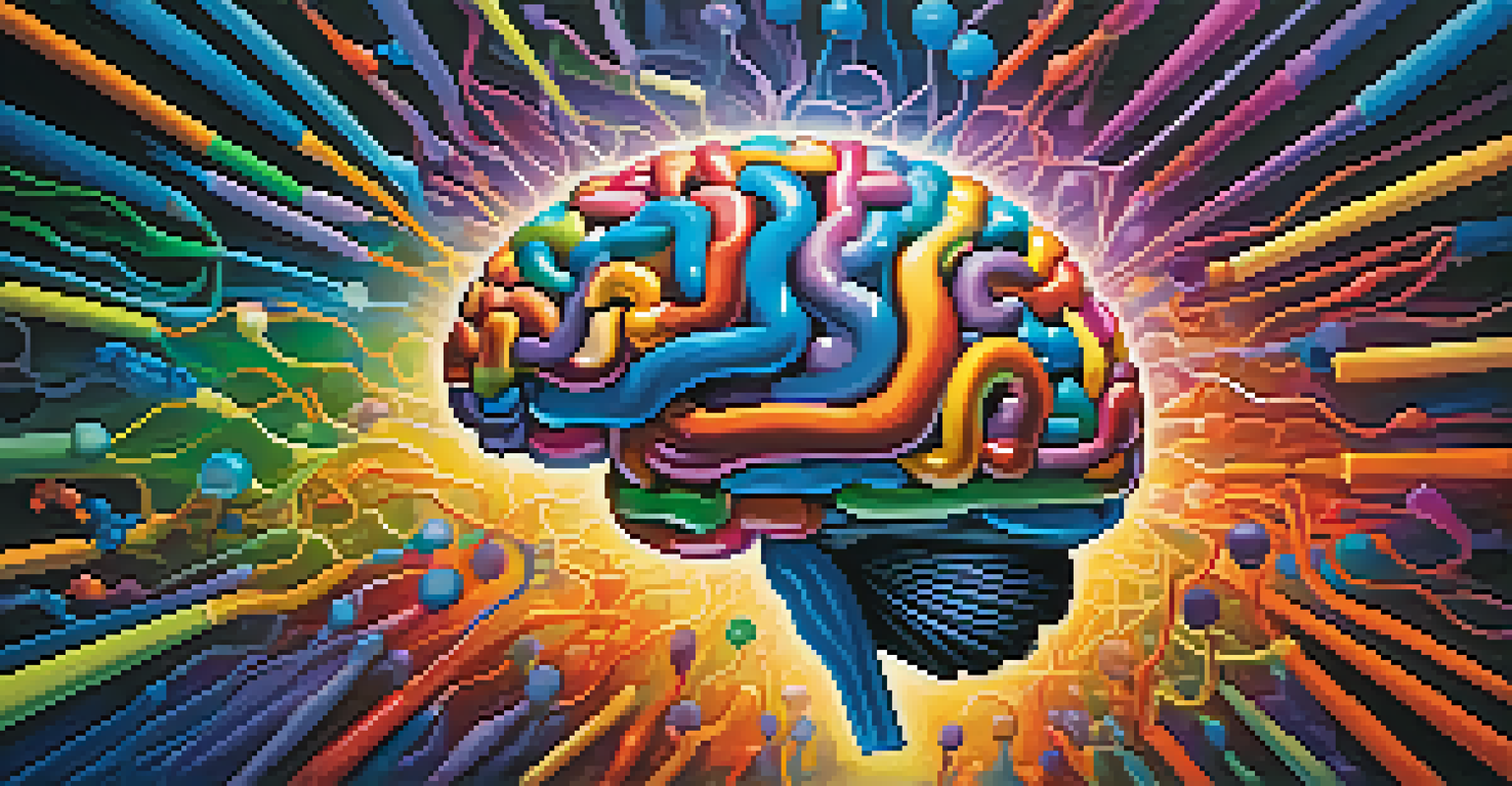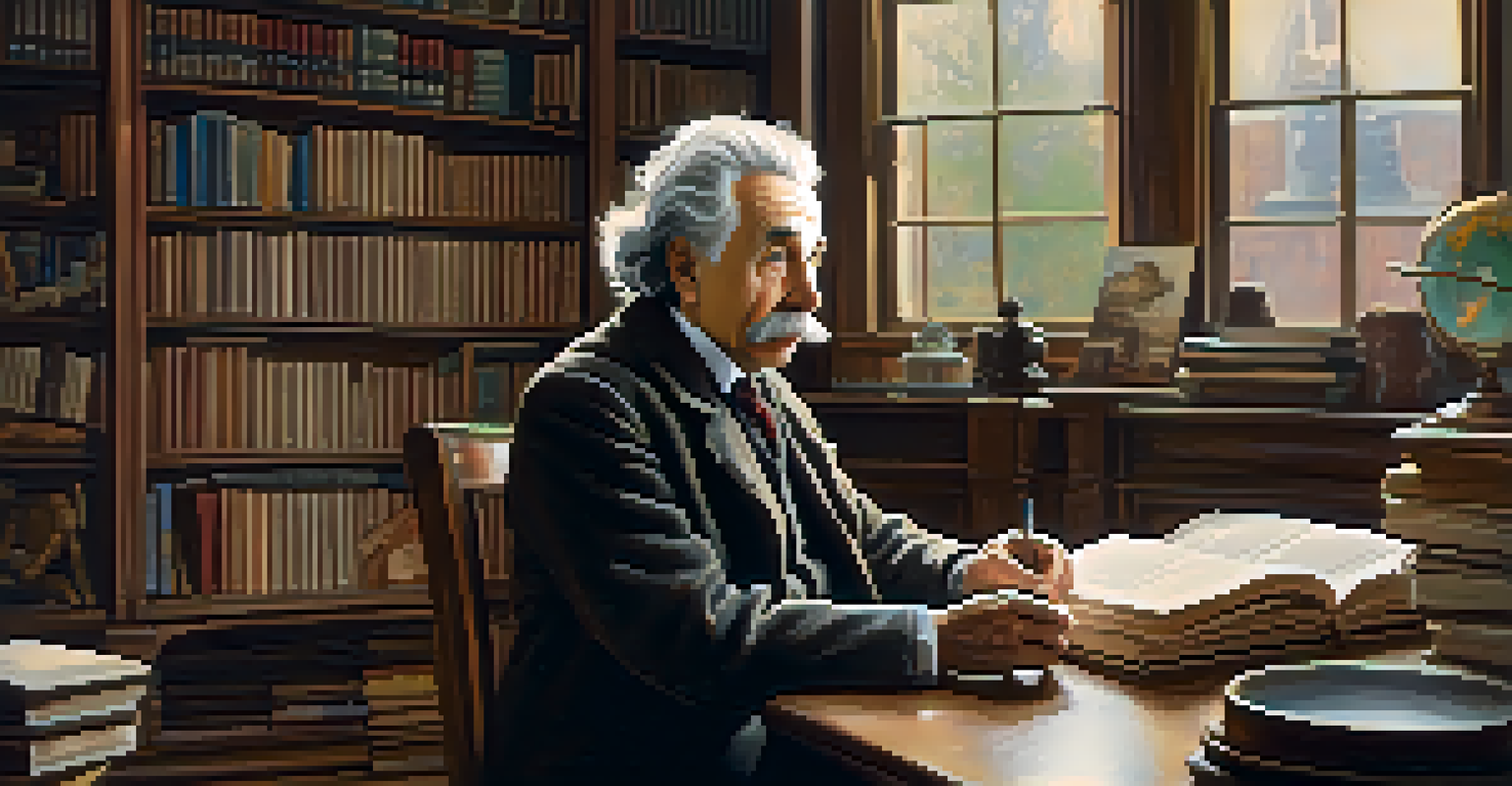Albert Einstein and the Role of Hallucinogens in Theory

Understanding Albert Einstein's Genius and Creativity
Albert Einstein is often hailed as one of the greatest minds in physics, revolutionizing our understanding of time and space. His theories, particularly the theory of relativity, opened up new avenues of thought in both science and philosophy. But what fueled his creativity? Some researchers suggest that Einstein's imaginative thinking may have been influenced by unconventional experiences, including the use of hallucinogens.
Imagination is more important than knowledge.
Einstein's ability to think outside the box was legendary. He famously said, 'Imagination is more important than knowledge,' highlighting his belief in the power of creative thinking. This perspective invites us to explore whether altered states of consciousness, such as those induced by hallucinogens, could have contributed to his groundbreaking ideas.
The intersection of science and altered states is not new. Throughout history, various thinkers have experimented with substances to expand their cognitive horizons. By examining Einstein's life, we can better understand if and how hallucinogens played a role in shaping his revolutionary concepts.
The Science Behind Hallucinogens and Creativity
Hallucinogens, like LSD and psilocybin, have been shown to alter perception and enhance creativity in some users. Research indicates that these substances can foster connectivity between different parts of the brain, leading to novel ideas and perspectives. This phenomenon raises the question: could such experiences have influenced Einstein's thought processes?

When individuals consume hallucinogens, they often report heightened creativity and the ability to think in abstract ways. This aligns with Einstein's own approach to problem-solving, where he often relied on thought experiments to visualize complex ideas. The enhanced cognitive flexibility provided by hallucinogens might have allowed Einstein to explore theoretical concepts more freely.
Einstein's Creativity and Imagination
Einstein believed that imagination was crucial to his scientific breakthroughs, suggesting that altered states of consciousness could have influenced his innovative thinking.
Moreover, the relationship between psychedelics and creativity isn't just anecdotal. Studies have documented increased divergent thinking—an essential component of creative problem-solving—after the use of hallucinogens. This scientific backdrop invites us to consider how similar experiences might have informed Einstein's groundbreaking theories.
Historical Context: Einstein and the Psychedelic Movement
The early 20th century was a time of exploration, not just in science but also in consciousness. The psychedelic movement began to take shape in the 1960s, but its roots can be traced back to earlier experiments with mind-altering substances. Understanding this historical context helps us appreciate the broader landscape in which Einstein's ideas emerged.
The mind is everything. What you think you become.
Einstein lived during a period when many scientists and artists were exploring altered states. Figures like Aldous Huxley and Timothy Leary popularized the idea of using psychedelics for creative and intellectual enhancement. Although there is no direct evidence linking Einstein to these practices, the cultural milieu may have influenced the broader scientific community's openness to unconventional ideas.
This era's spirit of inquiry and experimentation may have provided fertile ground for Einstein's theories to take root. By examining the societal attitudes toward hallucinogens, we can gain insight into how such substances may have indirectly shaped the scientific discourse of Einstein's time.
Einstein's Personal Views on the Mind and Reality
Einstein was known for his profound reflections on the nature of reality, often pondering the relationship between mind and universe. He recognized that human perception plays a crucial role in understanding the cosmos. This philosophical stance opens up intriguing possibilities regarding the influence of hallucinogens on his worldview.
Throughout his life, Einstein expressed a fascination with the limits of human understanding. He believed that our perceptions shape our reality, a concept that resonates with the experiences reported by those who have used hallucinogens. This alignment suggests a potential synergy between Einstein's thoughts and the insights gained through altered states of consciousness.
Hallucinogens and Enhanced Creativity
Research indicates that hallucinogens can foster connectivity in the brain, potentially allowing thinkers like Einstein to explore complex ideas more freely.
By exploring the connections between Einstein's philosophy and the effects of hallucinogens, we can better appreciate how such experiences may have contributed to his groundbreaking theories. This intersection of science and philosophy invites us to rethink the boundaries of knowledge and creativity.
The Debate: Did Hallucinogens Influence Einstein's Work?
The question of whether hallucinogens played a role in Einstein's theories remains a topic of debate among scholars and enthusiasts alike. While some argue that his genius stemmed purely from intellectual rigor, others suggest that altered states may have provided him with unique insights. This divergence of opinion highlights the complexity of creativity and inspiration.
Critics argue that attributing Einstein's success to hallucinogens undermines his hard work and intellectual prowess. After all, his theories were based on solid mathematical principles and rigorous scientific thought. Yet, proponents of the hallucinogen hypothesis point out that many great thinkers have drawn inspiration from unconventional sources, suggesting that creativity often thrives in unexpected ways.
Ultimately, the relationship between hallucinogens and intellectual achievement is multifaceted. While we may never definitively answer whether these substances influenced Einstein, exploring this question encourages us to consider the diverse factors that contribute to genius and innovation.
Modern Perspectives: Psychedelics and Scientific Innovation
Today, there is a resurgence of interest in the potential role of psychedelics in enhancing creativity and innovation. Scientists are revisiting the idea that altered states of consciousness can lead to breakthroughs in various fields, including technology and medicine. This contemporary exploration echoes how historical figures like Einstein may have approached their work.
With ongoing research into the therapeutic benefits of psychedelics, including their potential to treat mental health issues, we are beginning to understand their broader implications. This modern perspective aligns with the idea that psychedelics can offer new ways of thinking and problem-solving, much like they might have for Einstein in his quest for knowledge.
Historical Context of Psychedelics
The cultural milieu of Einstein's time included an exploration of altered states, suggesting that the openness to unconventional ideas may have shaped scientific discourse.
By examining the role of psychedelics in today's scientific landscape, we can draw parallels to Einstein's time. Understanding how these substances can unlock creative potential opens the door to a new era of innovation, reminding us that the pursuit of knowledge often involves venturing into the unknown.
Conclusion: The Legacy of Einstein and Hallucinogens
As we reflect on the life and theories of Albert Einstein, the potential influence of hallucinogens remains an intriguing topic. While we may never fully understand the extent to which altered states shaped his ideas, exploring this connection enriches our appreciation for the complexities of creativity. Einstein's legacy serves as a reminder that the quest for knowledge can take many forms.
The interplay between science, philosophy, and altered states of consciousness invites us to think critically about how we approach our own creative processes. Whether through rigorous study or unconventional exploration, the pursuit of understanding is a deeply personal journey. Like Einstein, we may find that inspiration often comes from unexpected sources.

Ultimately, the relationship between hallucinogens and Einstein's work prompts us to consider the broader implications for creativity and innovation in our own lives. By embracing a multitude of perspectives, we can honor Einstein's legacy while encouraging a new generation of thinkers to explore the uncharted territories of knowledge.